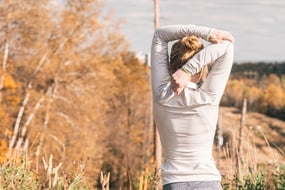When I was first learning mindfulness, I was working as a preschool teacher in a classroom for two-year-old children.
I decided to use the mindful “aahhh breath” as part of my circle time with the toddlers. Each morning we breathed in deeply. On the exhale, we let out a long, satisfying “aahhh!” Throughout the day, whenever a child got frustrated, or the room became a bit too energized and chaotic, I would say, “It’s time to take an aahhh breath.” It was a soothing balm that calmed the room and reduced my stress.
On one challenging day I was running thin on patience and a bit irritated. A little boy looked at me and did the aahhh breath. He completely shifted my mood and had me smiling the rest of the day.
To this day, I still enjoy a long, satisfying aahhh exhale.
Learning Joyfully
I began to realize that toddlers were the perfect teachers of mindfulness. They naturally gave their full attention to the present moment, with open hearts and endlessly curious minds.
My own mindfulness instructor provided me with assignments to practice mindfulness while doing little things, like washing my hands. I then went to work the next day, and would watch a toddler give their full attention to the feeling of water falling over their hands. In that moment, for them, there was only the wetness of the water, the sudsy soap, and the bubbles—the perfect example of simple, effortless presence. They taught me how to mindfully wash my hands as a joyful experience, and not as a mindfulness practice on my to-do list.
My mindfulness instructor would say to take a slow, mindful walk around the neighborhood. I would take the toddlers out for a walk around the pond. As we meandered along, they pointed out the bugs on the sidewalks, the dandelions in the grass, the moon in the sky, the feeling of the wind, and the sound of the birds and airplanes. They fully experienced the world around them, naturally, with wonder and acceptance. They taught me to look around more, pay attention, and appreciate whatever the moment was offering.
Overcoming Frustration
At home, when I was practicing my sitting meditation, feeling the rise and fall of my belly with the rhythm of my breath, I would see my attention get lost over and over again in thoughts of what someone shouldn’t have said, or fears of what might happen tomorrow. The more I sat trying to keep my focus on my breath, the more I became aware of my thinking patterns.
It was painful to see how petty or judgmental I could be at times. It was often frustrating and annoying to see how much my mind wandered and focused on negativity.
During those times, the practice of gentleness, compassion, and smiling became my strongest tools. When I realized, in the middle of my meditation, that my mind was rehashing a conversation with a friend and criticizing him, I smiled and gently felt the breath in my belly. Mindfulness showed me how much pain and anger were created by replaying the past over and over again in my mind.
Mindfulness showed me how much fear and stress were created by thoughts of future events that never happened. The more I became aware of how the thoughts of the past and the future created suffering, the more I realized I had a choice to shift my attention and fully experience the moment.
Discovering The Impact Of Mindfulness
I have been practicing mindfulness for thirty years, and it has changed my life in ways I did not expect.
In the past, I would stand in a grocery line, getting annoyed at the checkout clerk for being so slow, and feeling disgusted with the store for not having more clerks. My thoughts of how the moment should be made me angry and tense.
Now I use the time standing in line to feel my breath, and to notice how the simple act of feeling the rhythmic rise and fall of the belly fills me with a deep sense of peace and ease. I can stand in line and feel gratitude for all the people who worked hard so I have food to eat.
Before practicing mindfulness, that way of waiting in line would never have occurred to me.
Being Wholly Present
In the past, when I was conversing with someone, I would be completely in my head, focused on all my thoughts about the conversation, criticizing their thinking, and planning my response.
Now I listen with my whole being. My heart feels what they are saying, my eyes make contact with their eyes, and I feel a true connection. My silent presence receives their words, and pauses before responding from my heart and meeting them fully in the moment. The toddlers showed me how mindfulness is our natural way of being in the world. Practicing mindfulness showed me how my opinions of how the world should be kept me from opening up to the peace that is present in every moment.
Is there an area in your life where you would like to be more mindful?
Kate is a helath coach and a certified meditation teacher. She has been practicing mindfulness for 32 years. She has taught mindfulness in a variety of settings such as women's prison, programs for at-risk youth, and for university research studies.
Are you interested in health coaching, or another role with Vera Whole Health? Check out our careers page for more info!
Sign up
Join our email list to receive the latest open positions, Vera Careers news, and more.





